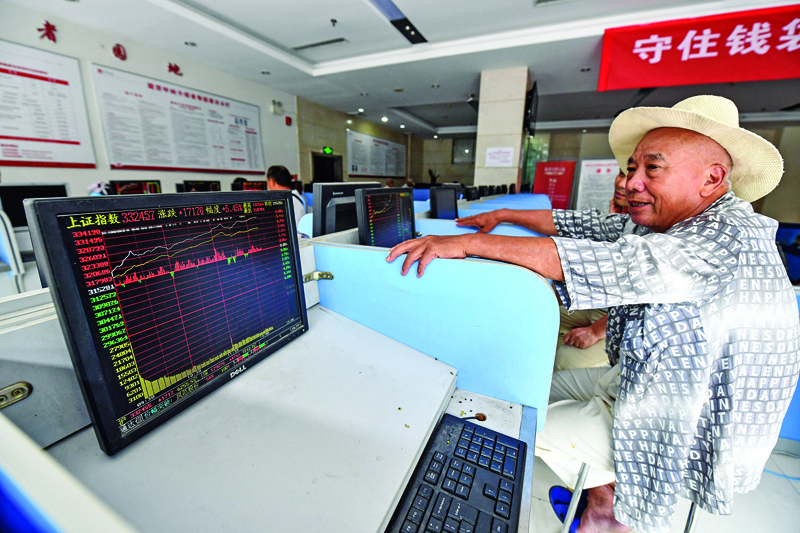
SHANGHAI: Shanghai stocks surged yesterday to a more than two-year high as investors piled in following a combination of rosy predictions for the market and strong economic data. The benchmark Shanghai Composite Index gained 5.71 percent, or 180.07 points, to 3,332.88, its best close since March 2018, while the Shenzhen Composite Index, which tracks shares on China's second exchange, gained 3.90 percent, or 79.70 points, to 2,121.59.
The Hang Seng Index in Hong Kong rose 3.81 percent, or 966.04 points, to 26,339.16. Mainland Chinese shares have languished for much of the year because of economic shutdowns caused by the coronavirus, but have been on a spurt lately, rising more than 12 percent over the past week. Investors have grown increasingly optimistic, helped by data last week showing that factory activity picked up pace in June.
Zhang Gang, a strategist with Central China Securities, said that and other signs had raised expectations of stronger-than-expected second-quarter economic growth. Figures are due for release next week. He added that recent new policies aimed at boosting the securities sector had also lifted sentiment, and he expected the rally to continue.
"The epidemic has suppressed consumption too much and now there's a huge rebound. The growth of the consumer sector will quickly return to a normal pace and so will general economic growth," he said. Economists caution, however, that momentum may weaken in the second half as key overseas markets continue to struggle with the health crisis.
Meanwhile, global stock markets rallied to four-week highs yesterday as investors counted on a revival in Chinese activity to boost global growth, even as surging coronavirus cases delayed business re-openings across the United States. MSCI's All-Country World Index, which tracks shares across 49 countries, rose 0.7 percent to its highest since June 6 after the start of European trading.
European shares jumped, with the pan-European STOXX 600 index rising 1.64 percent. Stocks exposed to China, like carmakers, industrials, energy firms and luxury goods makers rose strongly, while banks also rallied. In Asia, MSCI's broadest index of Asia-Pacific shares outside Japan climbed 1.6 percent to its highest since February, with the bullish sentiment spilling into other markets.
E-Mini futures for the S&P 500 firmed 1.2 percent. Among the reasons investors cited for the buying was improving economic data - UBS noted Citi's Economic Surprise Index for the US has risen to its highest level on record. The index measures how well economic data releases are faring relative to consensus forecasts.
In Hong Kong, Jefferies chief global equity strategist Sean Darby said the positive sentiment towards Asian markets was the result of better than expected regional economic data and elevated liquidity levels. Most markets gained ground last week as a raft of economic data from June beat expectations, although the resurgence of coronavirus cases in the United States is clouding the future.
Better-than-forecast data on US jobs creation and factory activity have also provided a boost to confidence, as have hopes for a vaccine, which observers say is key to kickstarting any recovery. Traders have piled back into stocks in a major way in recent months-with the help of vast government and central bank support-and analysts have suggested the gains are also being helped by a fear of missing out on the rally.
"The global economic data and positive coverage on potential COVID-19 vaccines and treatments represent a… whirligig of positive news that is overwhelming gnarly headline flows around the daily virus case counts in the US," said AxiCorp's Stephen Innes. Jeffrey Halley at OANDA said: "Hong Kong concerns are fading as fast as they began, as the new China-imposed security laws allow money to talk without the annoying interference of protestors."
But he added that the "story still has more to run in a geopolitical context", pointing out that Donald Trump was still to sign a bill censuring Chinese officials linked to the law, which would likely lead to retaliation by Beijing. "The scale of those measures will dictate whether geopolitics will have more to say on global financial markets," he said in a note. Tokyo piled on 1.8 percent, while Singapore, Seoul, Taipei and Mumbai were all more than one percent higher, with Wellington and Jakarta also up.
Curbs reimposed
But there remains trepidation on trading floors as new infections spike around the world. Some US states are reporting record daily increases, with a number of officials considering reimposing lockdown measures, while Brazil and India are also seeing worryingly large rises. And Australia said it would effectively seal off the state of Victoria from the rest of the country as authorities struggle to control a surge in cases.
For the first time since the global pandemic began, the border between Australia's two most populous states-Victoria and New South Wales-will be closed, beginning midnight today, officials from both states said. The outbreak sent Sydney falling 0.7 percent. Spain, South Africa, Japan and the Philippines are among several other countries to see an uptick in new virus cases. "For now the positive data surprises and huge fiscal and monetary stimulus are the overwhelming forces," National Australia Bank's Rodrigo Catril said in a note.
"But the increase in COVID-19 infections, not just in the US, means that they need to be closely monitored-the introduction of more severe containment measures has the potential to derail the positive vibes in markets." Shane Oliver, at AMP Capital Investors, said the recovery would likely be slower than the "Deep V" rebound that many are hoping for. "Trends in new coronavirus cases along with pressure on medical systems will continue to be watched closely, particularly in US states," he said. - Agencies










